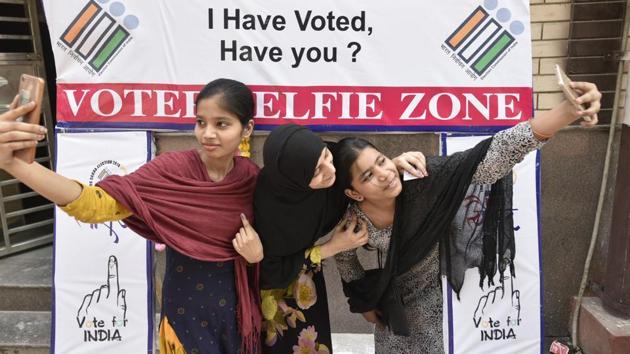Delhi assembly election 2020: In Delhi’s ‘sensitive’ areas, voters determined to make it count
In the run up to the 2020 polls, Seelampur witnessed violent protests against the Citizenship Amendment Act (CAA) and so has Delhi’s Jamia Nagar, which comes under the Okhla constituency in East Delhi parliamentary segment.
New Delhi: Friday’s namaz at the Idgah mosque in northeast Delhi’s Jafarabad Idgah was slightly different. The imam followed up the sermon with an appeal to the people to vote in large numbers on Saturday.

“Make sure that you vote,” he said, adding that residents in the locality – which comes under the Seelampur constituency – should not be deterred by “gunfire incidents”. The imam was referring to an incident that took place around 1.30pm -- the same time when Friday prayers began in different mosques in the area -- in which two gunmen fired four rounds near a shop in the area, even as every nook and cranny of the constituency was guarded by a large posse of police personnel and officers of the Central Armed Police Force.
Though no person was injured in the firing, local residents were anxious about it. A large number of them, however, maintained that they will vote in large numbers for reasons that range from education to civic issues.
“We will not be scared. We will vote in large numbers because our children need better education. We need a leader who can make that possible,” said 43-year-old Rabia Khan, a resident of New Seelampur locality.
“We also expect that this election brings an end to sewer problems and we start getting cleaner water in our neighbourhood,” said Intekhab Khan, 60, a resident of Jafarabad in Seelampur constituency, which had recorded a voter turnout of around 71.81% in the 2015 polls.
In the run up to the 2020 polls, Seelampur witnessed violent protests against the Citizenship Amendment Act (CAA) and so has Delhi’s Jamia Nagar, which comes under the Okhla constituency in East Delhi parliamentary segment. Okhla has also hit the headlines for the ongoing anti-CAA protest at Shaheen Bagh – that also grabbed centrestage in Delhi’s political campaigns in the run up to the February 8 polls.
Together, these two constituencies have around 260 polling stations that have been marked as “critical” or “sensitive” by the election commission. There are 3,841 polling booths in 516 polling locations across all 70 constituencies in Delhi. Polling locations designated as ‘sensitive’ are guarded by larger number of security personnel. In 2015, as many as 715 polling locations were marked either “critical” or “sensitive”.
Residents across localities in Okhla also claimed that they too would vote in large numbers – some of them said that they would keep in mind a “national crisis” in the light of the anti-CAA protests in Shaheen Bagh, others claimed that they would vote to register their protest against the Shaheen Bagh protest. Many, however, said they would stick to civic issues – water, sewer, roads, schools and health care.
“People are anxious across the nation with the citizenship law and related issues. It is important to vote and people understand that better today,” said 25-year-old Amreen, a corporate executive who lives in Abul Fazl Enclave, a locality in Okhla constituency, which had recorded 60.91% voter turnout in 2015 assembly polls.
Sahi Ram, 47, a resident of Madanpur Khadar in Okhla constituency, said: “These are strange times. A group of people have blocked an arterial road for nearly two months now. We need to vote for a leader who can assert that there is no place for such anarchy.”
For Nusrat Shaheen, a resident of Shaheen Bagh, this is an election for “basic needs” more than anything else. As she said so, her neighbour, 32-year-old Zakiya Irfan pointed towards overflowing drains and broken roads in the locality. “Who is supposed to fix this? The person who is voted to power. We will vote in large numbers,” said Irfan.
On Friday, large parts of the Okhla assembly witnessed heavy deployment of security forces and barricades on major roads amid heightened threat perception ahead of the polls. In the last one month, Shaheen Bagh and neighbouring localities where protests are underway have witnessed three incidents of firing.






